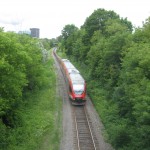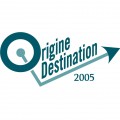The 2011 Origin-Destination (O-D) survey was completed in Fall 2011. 25,374 telephone interviews were completed, representing 5.0% of all households, which is considered a rich sample.
The results of the survey are summarized by district as well as organized in trip tables below. A single PDF summarizing the survey’s key findings is also available.
Summary of Results
The final report summarizing the results of the survey is broken down by section:
Summary by TRANS District
Key demographic and travel characteristics are provided below for each of the 26 TRANS Districts. Each pair of pages associated with each district presents:
- A map of the district
- Demographic characteristics for the district
- Occupational status of the district’s residents
- Characteristics of the district’s travellers, comprising the number of transit pass holders, licensed drivers and telecommuters
- Selected travel indicators, including overall trip rates
- Breakdowns of household size (number of occupants), households by vehicle availability and households by dwelling type
- Breakdown of the district’s population and employed labour force by gender and age cohort
- A map showing the five greatest origins or five greatest destinations from/to the district during the AM peak period (0630 to 0859), as well a table of the magnitude of the full 26 origins or destinations. Either origins only or destinations only are shown, depending on whether the district’s total origins or the total destinations were greatest during the AM peak period. For clarity, trips originating from the district are shown in red, and trips destined to the district are shown in green
- Breakdown of trips by purpose, for the 24 hours, AM peak period and PM peak period
- Breakdown of trips by mode of travel, for the 24 hours, AM peak period and PM peak period
Note that all trip rates and trip numbers presented in this section are exclusive of external trips (trips originating in the survey area with a destination outside the area).
All trip rates and trip numbers differ somewhat from those in the original consultants’ report, based on additional analysis. All numbers have been rounded to the nearest 10. As a result, there might be some minor differences between the control totals and totals calculated for each category.
National Capital Region
City of Ottawa
Ville de Gatineau and MRC
| Gatineau and MRC | Ville de Gatineau |
| Transit Service Area of the STO | Île de Hull |
| Hull Périphérie | Plateau |
| Aylmer | Rural Northwest |
| Pointe Gatineau | Gatineau Est |
| Rural Northeast | Buckingham/Masson-Angers |
Origin-Destination Trip Tables
Two tables are provided below, which organize trip data all trip purposes and work, respectively, for all modes, auto driver, auto person, and transit, during 24-hour, AM peak, and PM peak periods.
All Trip Purposes
| Mode | 24-Hour Period | AM Peak Period (6:30-8:59) | PM Peak Period (15:30-17:59) |
|---|---|---|---|
| All Modes | Trips | Trips | Trips |
| Auto Driver | Trips | Trips | Trips |
| Auto Person | Trips | Trips | Trips |
| Transit | Trips | Trips | Trips |
Work Trips
| Mode | 24-Hour Period | AM Peak Period (6:30-8:59) |
|---|---|---|
| All Modes | Trips | Trips |
| Auto Driver | Trips | Trips |
| Auto Person | Trips | Trips |
| Transit | Trips | Trips |
Publications
| Trends in Urban Travel – Implications for Planning and Forecasting |
| Rural Travel Around an Urban Area – Completing the Picture of Travel |



